Episode 392: News from St. Louis-based Urban Buds and the ASCFG Urban Farming Conference; Plus Our State Focus: Florida
March 13th, 2019
Podcast: Play in new window | Download
Subscribe: Apple Podcasts | Podcast Index | RSS | More
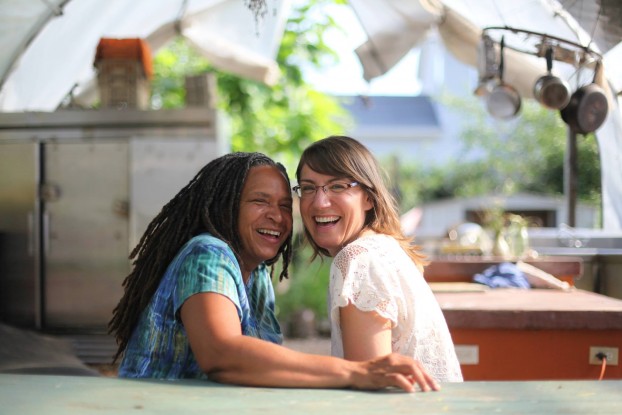
Today, we return to St. Louis, Missouri, to check in with the dynamic duo, Mimo Davis and Miranda Duschack of Urban Buds.
Not only will you hear more about their farm’s expansion news, I especially wanted them to share highlights of the upcoming Urban Farming Conference that they and others have organized as a program of the Association of Specialty Cut Flower Growers.
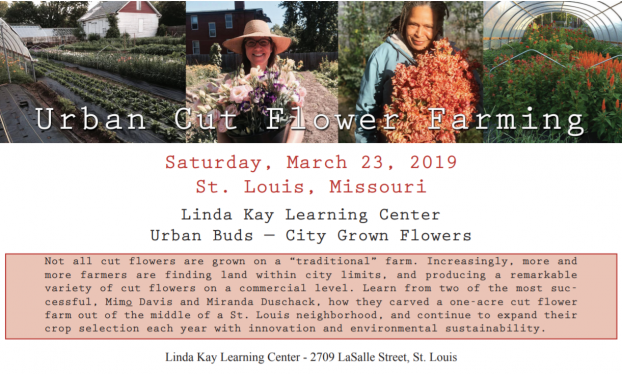
Every other year, ASCFG has a large annual symposium, such as the Raleigh conference last year. Then, during the alternating years, such as what’s happening during 2019, ASCFG produces several topic-focused sessions in regions around North America. Later this month, on Saturday, March 23rd, the second such event of the year heads to St. Louis.
You’ll hear a preview of some of the presenters and their topics covered at this one-day event, which includes a panel presentation from Mimo and Miranda and owners of two other Missouri flower farms — all about the results of their research and trials on Winter production. There will also be a tour of the local floral wholesaler, Baisch & Skinner, and a farm tour at Urban Buds.
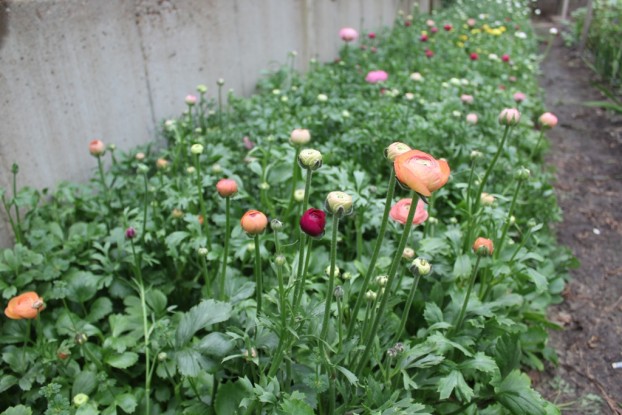
Spring will have barely arrived outdoors, but inside the greenhouses and high tunnels at Urban Buds, beautiful seasonal flowers will be on full display. I’m excited for the attendees — the city farm is a sight to behold and proof that a flower farm can be just as successful on small plots as well as on larger acreage.
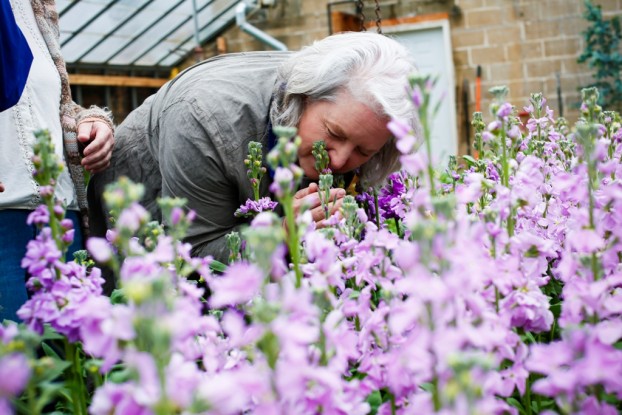
I love how the Urban Farming conference is described by ASCFG on its web site: “Not all cut flowers are grown on a traditional farm. Increasingly, more and more farmers are finding land within city limits, and producing a remarkable variety of cut flowers on a commercial level. Learn from two of the most successful, Mimo Davis and Miranda Duschack, how they carved a one-acre cut flower farm out of the middle of a St. Louis neighborhood, and continue to expand their crop selection each year with innovation and environmental sustainability.”
Here is a link to the ASCFG Urban Farming Conference details, including registration and lodging.
Here is a link to my 2016 Slow Flowers Podcast interview with Mimo and Miranda, Episode 238.
See more about Urban Buds on Instagram

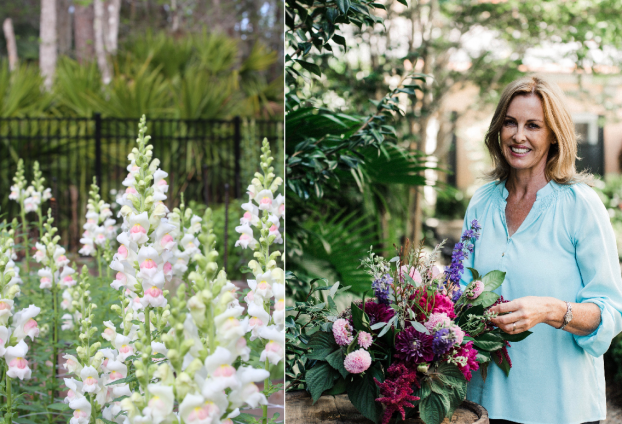
Our theme for 2019 – Fifty States of Slow Flowers – continues today, with Kate Read of Grey Tabby Gardens in Lake Mary, Florida.
Grey Tabby Gardens is located in the central part of the state; she describes her floral enterprise as “a boutique cut flower garden and design studio.”
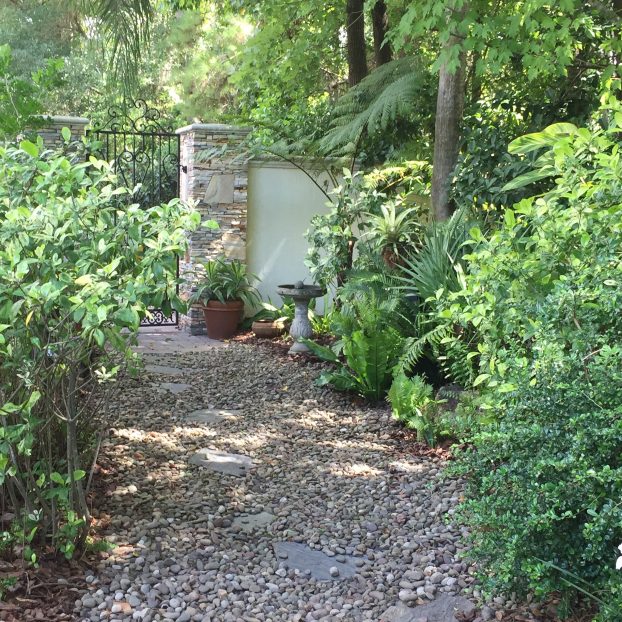
Kate grew up in England and brings a love of English gardens with her wherever she lives, including Florida, which she has called home for 18 years.
She writes this on her web site: “When I first moved to Florida there seemed to be very little interest in growing the type of flowers I was familiar with. My research led me to the “Slow Flower” movement and the desire amongst many flower lovers to source locally grown cut flowers, rather than imported flowers. I began to plan and plant a sizeable cutting garden where I could grow many of the lovely seasonal flowers that reminded me so much of those idyllic English gardens. The result is an ever evolving collation of unique and difficult to source garden fresh flowers styled into lush bouquets and arrangements and available to buy!”
The flowers that are grown at Grey Tabby Gardens are nurtured from seed to bloom and are tended using responsible practices. They have been naturally grown without the use of toxic chemicals or synthetic fertilizers and have been happily visited by bees, butterflies and hummingbirds.
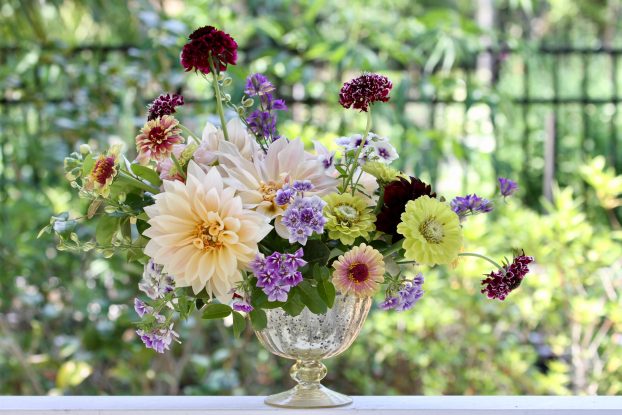
Thanks so much for joining me today. I’m just back from the Philadelphia Flower Show where my mind was fully blown, not only by the warm welcome shown to me on the Designer’s Studio stage, where I presented the Slow Flowers story through flowers, but also by the once-in-a-lifetime opportunity to see and cover the FTD World Cup floral competition.
Twenty Three countries sent a designer to compete on the world stage and over the course of three days, tens of thousands of flower show attendees witnessed the highest level of talent in real time. I’ll be writing about the competition for Florists’ Review and Canadian Florist, so you can read more about it in the near future. Suffice it to say, there is some kind of new dynamic, new energy being infused in the profession of floral design, especially here in the U.S., where florists of all stages of experience and style are inspired to elevate their craft and art to new levels.
Congratulations to all the remarkable FTD World Cup competitors — you are the cream of the crop — and special congratulations to Australian floral designer Bart Hassam for winning this international floral competition. I’ll have a link to beautiful images and videos from the World Cup in today’s show notes — you must take a look and drink it in.
Thanks so much for joining me on this journey, seeking new
and inspiring voices, people with passion, heart, commitment and expertise to
share with you. I hope today’s episode gave you at least one inspiring insight
or tip to apply to your floral enterprise. What you gain will be multiplied as
you pay it forward and help someone
else.
Truly, we have a vital and vibrant community of flower farmers and floral
designers who together define the Slow Flowers Movement. As our cause gains more supporters
and more passionate participants who believe in the importance of the American
cut flower industry, the momentum is contagious.
I know you feel it, too. I value your support and invite you to show your thanks and with a donation to support my ongoing advocacy, education and outreach activities. You can find the donate button in the column to the right.

The Slow Flowers Summit is coming up soon — on July 1 & 2nd in St. Paul, Minnesota. More than half of the registration slots have been grabbed, so don’t miss out on this opportunity to join with Slow Flowers thinkers and doers in person.
One of our past year’s speakers dubbed the Summit a “floral mind meld,” and I love that concept. Come and be a part of the incredible and uplifting experience! You can make your way to slowflowerssummit.com to learn all about the many opportunities to join us — from flower farm tours and dinner on a flower farm to business and branding presentations to interactive and inspiring design sessions . . . all designed to serve you! Subscribe to Summit news and updates at slowflowerssummit.com.
Thank you to our Sponsors who we’ve spotlighted today:
And thank you to our lead sponsor, Florists’ Review magazine. I’m delighted to serve as Contributing Editor for Slow Flowers Journal, found in the pages of Florists’ Review. It’s the leading trade magazine in the floral industry and the only independent periodical for the retail, wholesale and supplier market. Take advantage of the special subscription offer for members of the Slow Flowers Community.
Association of Specialty Cut Flower Growers. Formed in 1988, ASCFG was created to educate, unite, and support commercial cut flower growers. It mission is to help growers produce high-quality floral material, and to foster and promote the local availability of that product. Learn more at ascfg.org.
Seattle Wholesale Growers Market, a farmer-owned cooperative committed to providing the very best the Pacific Northwest has to offer in cut flowers, foliage and plants. The Growers Market’s mission is to foster a vibrant marketplace that sustains local flower farms and provides top-quality products and service to the local floral industry. Visit them at seattlewholesalegrowersmarket.com
Syndicate Sales, an American manufacturer of vases and accessories for the professional florist. Look for the American Flag Icon to find Syndicate’s USA-made products and join the Syndicate Stars loyalty program at syndicatesales.com.
The Slow Flowers Podcast has been downloaded more than 422,000 times by listeners like you. Thank you for listening, commenting and sharing – it means so much. Thank you all!
I’m Debra
Prinzing, host and producer of the Slow Flowers Podcast.
Next week, you’re invited to join me in putting more American grown flowers on
the table, one vase at a time. And If
you like what you hear, please consider logging onto iTunes and posting a
listener review.
The content and opinions expressed here are either mine alone or those of my guests alone, independent of any podcast sponsor or other person, company or organization.
The Slow Flowers Podcast is engineered and edited by Andrew Brenlan. Learn more about his work at soundbodymovement.com.
Music Credits:
Dirtbike Lovers; Symphony 40 in G Minor; Rabbit Hole; Gaena; Perspirationby Blue Dot Sessionshttp://www.sessions.bluehttps://creativecommons.org/licenses/by-nc/4.0/
Lovely by Tryad http://tryad.bandcamp.com/album/instrumentals
http://creativecommons.org/licenses/by-sa/3.0/
In The Field
Music from:
audionautix.com









March 13th, 2019 at 9:51 am
[…] of the upcoming Urban Farming Conference that they and others have organized as a program […]Episode 392: News from St. Louis-based Urban Buds and the ASCFG Urban Farming Conference; Plus Our S… this post has been replublished from the original […]